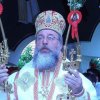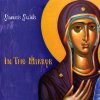His Grace Bishop Longin of New Gračanica and Midwest America was born on September 29, 1955 as Momir Krčo in the town of Kruscanje Olovo. His parents were Stanoje and Andja Jovanovic. He attended grade school in Olovske Luke from 1962 to 1970. He entered Three Hierarchs Seminary in Monastery Krka in 1970 and graduated in 1975.
During this time he was tonsured a monk and received the small schema as a fifth year student. The tonsuring was done by Bishop Stefan of Dalmatia on the eve of the school Slava of the Holy Three Hierarchs on February 11, 1975. At the Divine Liturgy on February 12th he was ordained a deacon by Bishop Stefan. On February 13th, he was ordained a priest (he was twenty years old at time of his priestly ordination.)
He entered the Moscow Theological Academy in 1975 where he graduated in 1979. From October 1980 to April 1981, he served in the Diocese of Zvornik-Tuzla as secretary of the Executive Board. He was also administrator of two parishes. On the decision of the Holy Synod of Bishops he was appointed as lecturer of the Holy Three Hierarchs Seminary in 1983 for two years.
At the Sabor of May 1985 he was elected Vicar Bishop of Mo¬rava to the Patriarch. He was consecrated on October 20, 1985. The Patriarch served the Divine Liturgy along with Metropolitan Vladimir of Rostov and Novo Cerkay (now deceased Metropolitan of Kiev) who had been Dean of the Moscow Theological Academy while Bishop Longin was a student. Also serving were other bishops. Longin was only 30 years old when he became a bishop. Bishop Longin was the youngest at the time of his consecration as bishops.
In May of 1986 he was elected Bishop of Australia and New Zealand, where he spent six and a half years. Besides serving the great territory of Australia he also built churches and was involved in work with the youth. Bishop Longin was known especially as a fighter for unity of the Serbian Church.
At the Sabor in 1992 at the request of His Holiness and brother hierarchs, Bishop Longin accepted the duty of being bishop of Dalmatia. He was not able to enter his residence in Sibenik, but had to reside in Monastery Krka, where he lectured at the seminary. With the blessing of His Holiness Patriarch Pavle, he journeyed to Canada and Australia where he collected donations for the suffering Serbian people. After the tragic occurences in August of 1995, Bishop Longin and the entire seminary from Monastery Krka stayed at Divcibare near Valjevo. At the same time he helped Bishop Lavrentije of Saba-Valjevo in diocesan matters. Along with Bishop Nikanor of Gornji Karlovac, he worked with refugees, visited the camps and delivered help which had been sent mainly by the Serbs in the Diaspora.
With the decision of His Holiness Patriarch Pavle, he was appointed on July 31, 1997 as auxiliary in the administration of the Diocese of America and Canada—New Gra¬čanica Metropolitanate. On May 23, 1998, he was appointed as Administrator of the Diocese of America and Canada—New Gračanica Metropolitanate, while on May 5, 1999, he was elected at the Holy Assembly of Bishops of the Serbian Orthodox Church, Sabor, as Bishop of the Diocese of America and Canada, New Gračanica Metropolitanate. This was the fulfilment of the request of the Diocesan Council and the Ecclesiastical Court as well as the desire of the clergy and delegates of the Seventh Church National Sabor held on April 23—24, 1999.
He was enthroned in New Gračanica on October 14, 1999 on behalf of Patriarch Pavle and the Holy Synod, by Metropoitan Amphilohije of Montenegro and the Coastlands.
In the meantime he was administrator of the Western American Diocese (2001-2006.) After the administrative unity was established in 2009, he was elected Bishop of the New Gračanica Midwest Diocese. He plays a great role in bringing about unity in the Serbian Church in America.





